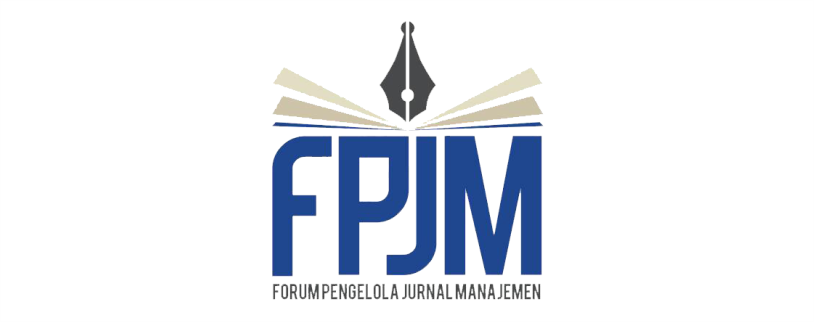The Effect of Harmonious Passion on Work Satisfaction and Life Satisfaction through Work-Life Enrichment Among Entrepreneurs
DOI:
https://doi.org/10.26905/jmdk.v11i2.10671Keywords:
Entrepreneurs, Harmonious Passion, Life Satisfaction, Work-Life Enrichment, Work SatisfactionAbstract
Becoming a successful entrepreneur requires passion. Although there has been much research on passion, little has explored the role of passion in work-life enrichment and, in particular, its impact on entrepreneurial life and job satisfaction. This study aimed to examine the influence of harmonious passion on job satisfaction and life satisfaction through work-life enrichment among entrepreneurs. The research method used in this study is quantitative. The total number of respondents was 310 entrepreneurs. The sampling technique used was a purposive sampling technique with data collection methods in the form of a questionnaire. The results of the study show that harmonious passion has a direct effect on job satisfaction with work-life enrichment. However, harmonious passion has no direct impact on life satisfaction. Indirectly, harmonious passion influences job satisfaction and life satisfaction through work-life enrichment. This research adds to the existing body of knowledge by demonstrating that entrepreneurs’ work-life enrichment can mediate the relationships between harmonious passion and work and life satisfactions. Moreover, it also addresses a notable gap in entrepreneurial passion research, particularly in non-Western, emerging contexts, and represents the inaugural investigation of this subject matter in Indonesia.
Downloads
References
Agha, K., Azmi, F. T., & Irfan, A. (2017). Work-life balance and job satisfaction: An empirical study focusing on higher education teachers in Oman. International Journal of Social Science and Humanity, 7(3), 164–171. https://doi.org/10.18178/ijssh.2017.v7.813
Alam, M. S. & Shin, D. (2021). A moderated mediation model of employee experienced diversity management: Openness to experience, perceived visible diversity discrimination and job satisfaction. International Journal of Manpower, 42(5), 733-755. https://doi.org/10.1108/IJM-06- 2019-0286.
AsiaToday.id. (2020, November 27). Di Asean, Rasio Kewirausahaan Indonesia tertinggal Dari Malaysia Dan Thailand. AsiaToday.id. Retrieved October 16, 2022, from https://asiatoday.id/read/di-asean-rasio-kewirausahaan-indonesia-tertinggal-dari-malaysia-dan-thailand.
Bayraktar, S., & Jiménez, A. (2022). Friend or foe? The effects of harmonious and obsessive passion on entrepreneurs’ well-being, strain, and Social Loneliness. Cross Cultural & Strategic Management, 29(2), 320–348. https://doi.org/10.1108/ccsm-03-2021-0056
Birkeland, I. K. & Buch, R. (2015). The dualistic model of passion for work: discriminate and predictive validity with work engagement and workaholism. Motivation and Emotion, 39(3), 392-408. http://dx.doi.org/10.1007/s11031-014-9462-x
Butt, H. P., Tariq, H., Weng, Q. & Sohail, N. (2019). I see you in me, and me in you: The moderated mediation crossover model of work passion. Personnel Review, 48(5), 1209-1238. https://doi.org/ 10.1108/PR-05-2018-0176
Burke, R. J., Astakhova, M. N., & Hang, H. (2015). Work passion through the lens of culture: Harmonious work passion, obsessive work passion, and Work Outcomes in Russia and China. Journal of Business and Psychology, 30(3), 457–471. https://doi.org/10.1007/s10869-014-9375-4
Carbonneau, N., Vallerand, R. J., Fernet, C., & Guay, F. (2008). The role of passion for teaching in intrapersonal and interpersonal outcomes. Journal of Educational Psychology, 100(4), 977–987. https://doi.org/10.1037/a0012545
Carlson, D. S., Kacmar, K. M., Wayne, J. H., & Grzywacz, J. G. (2006). Measuring the positive side of the work–family interface: Development and validation of a work–family enrichment scale. Journal of Vocational Behavior, 68(1), 131–164. https://doi.org/10.1016/j.jvb.2005.02.002
Carpentier, J., Mageau, G. A., & Vallerand, R. J. (2012). Ruminations and flow: Why do people with a more harmonious passion experience higher well-being? Journal of Happiness Studies, 13, 501-518. https://doi.org/10.1007/s10902-011-9276-4
Chummar, S., Singh, P., & Ezzedeen, S. R. (2019). Exploring the differential impact of work passion on life satisfaction and job performance via the work–family interface. Personnel Review, 48(5), 1100–1119. https://doi.org/10.1108/pr-02-2017-0033
Clohessy, T., Whelan, E., & Paradis, K. F. (2020). Does passion for physical activity spill over into performance at work? Examining the direct and indirect effects of passion and life satisfaction on organizational performance and Innovativeness. International Journal of Sport and Exercise Psychology, 19(5), 794–814. https://doi.org/10.1080/1612197x.2020.1766537
Coetzee, M., & Bester, M. S. (2019). Probing the role of psychosocial career mechanisms in the harmonious work passion-career satisfaction link. Personnel Review, 48(5), 1135-1149.
Craven, R. G., Ryan, R.M., Mooney, J., Vallerand, R.J., Dillon, A., Blacklock, F. & Magson, N. (2016). Toward a positive psychology of indigenous thriving and reciprocal research partnership model. Contemporary Educational Psychology, 47, 32-43. https://doi.org/10.1016/j.cedpsych.2016.04.003
Diener, E., Emmons, R. A., Larsen, R. J., & Griffin, S. (1985). The satisfaction with life scale. Journal of Personality Assessment, 49(1), 71–75. https://doi.org/10.1207/s15327752jpa4901_13
Erdogan, B., Bauer, T. N., Truxillo, D. M., & Mansfield, L. R. (2012). Whistle while you work. Journal of Management, 38(4), 1038–1083.https://doi.org/10.1177/0149206311429379
Gayathri, N., & Karthikeyan, P. (2016). The role of self-efficacy and social support in Improving Life Satisfaction. Zeitschrift Für Psychologie, 224(1), 25–33. https://doi.org/10.1027/2151-2604/a000235
Ghozali, I. (2014). Structural equation modeling: metode alternatif dengan partial least square (PLS) (4th ed.). Badan Penerbit Universitas Diponegoro.
Gillet, N., Vallerand, R. J., Schellenberg, B., Bonnaventure, J. A., Becker, M., Brault, S., ... & Sandrin, E. (2022). On the role of harmonious and obsessive passion in work and family outcomes: A test of the quadripartite approach. Current Psychology, 1-12. https://doi.org/10.1007/s12144-022-03442-y
Hagmaier, T., Abele, A. E., & Goebel, K. (2018). How are career satisfaction and life satisfaction associated? Journal of Managerial Psychology, 33(2), 142–160. https://doi.org/10.1108/jmp-09-2017-0326
Hair, J. F., Black, W. C., Babin, B. J., & Anderson, R. E. (2014). Multivariate Data Analysis (7th ed). Edinburgh: Pearson Education Limited.
Houlfort, N., Fernet, C., Vallerand, R. J., Laframboise, A., Guay, F., & Koestner, R. (2015). The role of passion for work and need satisfaction in psychological adjustment to retirement. Journal of Vocational Behavior, 88, 84–94. https://doi.org/10.1016/j.jvb.2015.02.005
Jan, G., & Zainal, S. R. M. (2020). Linking cooperative psychological climate, harmonious passion, and servicing empowerment with innovative work behaviour. Asian Academy of Management Journal, 25(2), 189-213. https://doi.org/10.21315/ aamj2020.25.2.8
Lafrenière, M. A. K., St-Louis, A. C., Vallerand, R. J., & Donahue, E. G. (2012). On the relation between performance and life satisfaction: The moderating role of passion. Self and Identity, 11(4), 516–530. https://doi.org/10.1080/15298868.2011.616000
Lavigne, G. L., Forest, J., & Crevier-Braud, L. (2012). Passion at work and Burnout: A two-study test of the mediating role of flow experiences. European Journal of Work and Organizational Psychology, 21(4), 518–546. https://doi.org/10.1080/1359432x.2011.578390
Li, J., Zhang, J. & Yang, Z. (2017). Associations between a leader’s work passion and an employee’s work passion: A moderated mediation model. Frontiers in Psychology, 8, 1447. https://doi.org/10.3389/fpsyg.2017.01447
Li, J., Zhang, J., Shao, B. & Chen, C. (2019). A latent profile analysis of work passion: Structure, antecedent, and outcomes. Personnel Review, 49(3), 846-863. https://doi.org/10.1108/PR-04-2019-0145
Lin, C. Y., & Huang, C. K. (2021). Employee turnover intentions and job performance from a planned change: the effects of an organizational learning culture and job satisfaction. International Journal of Manpower, 42(3), 409-423.
Luth, M. T., Flinchbaugh, C. L., & Ross, J. (2017). On the bike and in the cubicle: The role of passion and regulatory focus in cycling and work satisfaction. Psychology of Sport and Exercise, 28, 37–45. https://doi.org/10.1016/j.psychsport.2016.10.003
Mageau, G. A., & Vallerand, R. J. (2007). The moderating effect of passion on the relation between activity engagement and positive affect. Motivation and Emotion, 31(4), 312–321. https://doi.org/10.1007/s11031-007-9071-z
McAllister, C. P., Harris, J.N., Hochwarter, W.A., Perrewe, P.L. & Ferris, G.R. (2017). Got resources? A multi-sample constructive replication of perceived resource availability’s role in work passion–job outcomes relationships. Journal of Business and Psychology, 32(2), 147-164. https://doi.org/10.1007/s10869-016-9441-1
McNall, L. A., Tombari, J. M., & Brown, M. M. (2021). Exploring how mindfulness links to work outcomes: Positive affectivity and work-life enrichment. Applied Research in Quality of Life, 16(1), 167-182. https://doi.org/10.1007/s11482-019-09762-9
Obrenovic, B., Jianguo, D., Khudaykulov, A., & Khan, M. A. S. (2020). Work-family conflict impact on psychological safety and psychological well-being: A job performance model. Frontiers in psychology, 11, 1-18. https://doi.org/10.3389/fpsyg.2020.00475
Pathak, D., & Srivastava, S. (2020). A journey from passion to satisfaction: Roles of belongingness and psychological empowerment. International Journal of Sociology and Social Policy, 40(3/4), 321–341. https://doi.org/10.1108/ijssp-11-2019-0237
Pollack, J. M., Ho, V. T., O’Boyle, E. H., & Kirkman, B. L. (2020). Passion at work: a meta-analysis of individual work outcomes. Journal of Organizational Behavior, 41(4), 311-331. https://doi.org/10.1002/job.2434
Philippe, F. L., Vallerand, R. J., & Lavigne, G. L. (2009). Passion does make a difference in people's lives: A look at well-being in passionate and non-passionate individuals. Applied Psychology: Health and Well-Being, 1(1), 3–22. https://doi.org/10.1111/j.1758-0854.2008.01003.x
Rhee, T. S., & Zheng, F. (2019). The effects of work-family enrichment on job and life satisfaction of Korean employees. International Journal of Financial Research, 10(5), 138. https://doi.org/10.5430/ijfr.v10n5p138
Sekaran, U., & Bougie, R. (2016). Research methods for business: A skill building approach. John Wiley & Sons.
Siddiqui, M. A., & Shah, M. H. (2017). Impact of Entrepreneurial Passion for Work on Behavioural Intention. Contemporary Social Sciences, 26(1),109-120.
Spehar, I., Forest, J., & Stenseng, F. (2016). Passion for work, job satisfaction, and the mediating role of belongingness. Scandinavian Journal of Organizational Psychology, 8(1), 17-27.
Taşdelen-Karçkay, A., & Bakalım, O. (2017). The mediating effect of work–life balance on the relationship between work–family conflict and life satisfaction. Australian Journal of Career Development, 26(1), 3-13.
Thorgren, S., Wincent, J., & Sirén, C. (2013). The influence of passion and work-life thoughts on work satisfaction. Human Resource Development Quarterly, 24(4), 469–492. https://doi.org/10.1002/hrdq.21172
Vallerand, R. J. (2010). On passion for life activities. Advances in Experimental Social Psychology, 97–193. https://doi.org/10.1016/s0065-2601(10)42003-1
Vallerand, R. J. (2012). The role of passion in sustainable psychological well-being. Psychology of Well-Being: Theory, Research, and Practice, 2(1), 1. https://doi.org/10.1186/2211-1522-2-1
Vallerand, R. J., Blanchard, C., Mageau, G. A., Koestner, R., Ratelle, C., Léonard, M., Gagné, M., & Marsolais, J. (2003). Les Passions de l'âme: On obsessive and harmonious passion. Journal of Personality and Social Psychology, 85(4), 756–767. https://doi.org/10.1037/0022-3514.85.4.756
Vallerand, R. J., Paquet, Y., Philippe, F. L., & Charest, J. (2010). On the role of passion for work in Burnout: A process model. Journal of Personality, 78(1), 289–312. https://doi.org/10.1111/j.1467-6494.2009.00616
Salas-Vallina, A., Pozo, M., & Fernandez-Guerrero, R. (2020). New times for HRM? Well-being-oriented management (WOM), harmonious work passion, and innovative work behavior. Employee Relations: The International Journal, 42(3), 561-581. https://doi.org/10.1108/ER-04-2019-0185
Wan, M. M., Carlson, D. S., Quade, M. J., & Kacmar, K. M. (2021). Does work passion influence prosocial behaviors at work and home? Examining the underlying work–family mechanisms. Journal of Organizational Behavior, 43(9), 1516–1534. https://doi.org/10.1002/job.2566
Wayne, J. H., Musisca, N., & Fleeson, W. (2004). Considering the role of personality in the work-family experience: Relationships of the big five to work–family conflict and facilitation. Journal of Vocational Behavior, 64(1), 108–130. https://doi.org/10.1016/s0001-8791(03)00035-6
Ye, Y., Lyu, Y. & He, Y. (2019). Servant leadership and proactive customer service performance. International Journal of Contemporary Hospitality Management, 31(3), 1330-1347. https://doi.org/10.1108/IJCHM-03-2018-0180
Yukhymenko-Lescroart, M. A., & Sharma, G. (2022). Passion for work and the well-being of working adults. Journal of Career Development, 49(3), 505-518. https://doi.org/10.1177/08948453209463
Downloads
Published
Issue
Section
License
Authors who publish with this journal agree to the following terms:
(1)Â Copyright of the published articles will be transferred to the journal as the publisher of the manuscripts. Therefore, the author confirms that the copyright has been managed by the journal.
(2) Publisher of Jurnal Penelitian is University of Merdeka Malang.
(3) The copyright follows Creative Commons Attribution–ShareAlike License (CC BY SA): This license allows to Share — copy and redistribute the material in any medium or format, Adapt — remix, transform, and build upon the material, for any purpose, even commercially.












